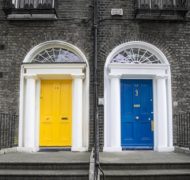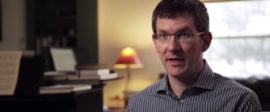Calling, Kingdom, Identity: Do You Know Who You Are? (1 Peter Sermon Notes)
Sermon Notes / Produced by The High Calling
1 Peter 2:9-10
“But you are a chosen race, a royal priesthood, a holy nation, God’s own people, in order that you may proclaim the mighty acts of him who called you out of darkness into his marvelous light. Once you were not a people, but now you are God’s people; once you had not received mercy, but now you have received mercy.”
Theological Focus: Who are we? As individuals, our self-identity is important to us. It tells us who we are and where we are going. Understanding our identity as God’s people, the church, is also critical. It guides and motivates our life and mission in the world. The First Letter of Peter says we are called by God out of darkness into God’s light. What are the blessings and the challenges of that call?
Introduction: Do You Know Who You Are?
This rich text from First Peter speaks of the identity of God’s people, the church. I offer here some thoughts on how one might approach this text to restate for hearers what it means to be part of Christ’s church, to encourage us to live out our God-given identity, and to make a difference in the world.Have you thought lately about how difficult it is for a television personality or actor to live an ordinary life? You’re in the public eye. People feel like they know you, but you don’t know them. As a television news anchor or reporter, for example, thousands of people see you on television every night. They know you, they identify with you. But you don’t know them.
When my wife and I were living in Minneapolis, a woman named Joan Steffend was a news anchor for the local NBC television station KARE-11. She lived in the suburb where we lived. Occasionally Debra and I saw her with her daughters at a school event or out shopping. One day we were sitting in a Baskin-Robbins having ice cream when Joan came in. We chatted. Somehow the conversation turned to what it’s like to be “known” on television by thousands of people when you don’t know them. Joan told us the story of being in a grocery store one day when a woman saw her. A look of dawning recognition came over the woman’s face. She quickly walked up to Joan with great excitement on her face, and with her hands flailing about, exclaimed, “Do you know who you are!?” I think the woman was trying to say, “I know who you are!” But it came out, “Do you know who you are?”
I love that story because it’s so true of human experience. When we first moved to Minneapolis and I was working in a large congregation, I went to the grocery store one Friday morning. I was dressed in an old work shirt and jeans. Pushing my grocery cart around a corner I ran into an elderly woman from our church—a woman whom I did not know. A sudden look of recognition came over her face, and she said to me, “You do this too?” As if to say, “You shop for groceries? You’re a real person?” Maybe it was her way of saying, “Do you know who you are?”
Last summer I walked into a pizza parlor in the town where we live, and there sat David Gregory of NBC News and Meet the Press. Like millions of other people, I knew who he was. But he didn’t know me from Adam or Eve. He was sitting eating pizza with his family. I thought of Joan Steffends’ story. Wouldn’t it be funny to go over to David Gregory and say, “Do you know who you are?” Of course I didn’t.
One Thanksgiving weekend I was walking down the street when I saw Vice President Joe Biden coming toward me on the sidewalk. He had his collar turned up and he was wearing sunglasses, but I knew who he was. As I walked past him, I chuckled to myself thinking, “It wouldn’t be a good idea to say to the Vice President, ‘Do you know who you are?’ ”—especially with three Secret Service men walking right behind him.
A. God’s Own People
Do you know who you are? We laugh at those stories. But it’s a good question when asked at the right time for the right reason. To ask a sad child or a struggling adolescent, “Do you know who you are?”—and then tell them how much you love them. That can be a powerful word of encouragement. To ask a friend or colleague who is facing a big challenge in life, “Do you know who you are?”—and then tell them how much you believe in them. That is a powerful word of encouragement. Or to say to a sick or dying person, “Do you know who you are?”—and then tell them what they mean to you and that they’re a child of God. That is a powerful word of comfort and peace.
Do you know who you are? That is the question the writer of First Peter was addressing in our text for this sermon: “But you are a chosen race, a royal priesthood, a holy nation, God’s own people” (1 Peter 2:9). First Peter was written late in the first century CE to Christians in small house churches in Asia Minor. The Christians in those churches were a minority in the Greco-Roman culture. Where they lived, Christianity was an unwelcome, despised foreign religion. By becoming Christians, they had suffered rejection and alienation from their family, from friends,and society. The label “Christian” made life difficult, if not dangerous. Most of them were probably Gentile Christians who had left their ancestral religion and family traditions behind. So they were viewed with suspicion. They were alienated socially, politically, and economically. They felt like strangers and exiles in their own land.Because of their faith, they suffered.[1]
So the author of First Peter wrote a letter to encourage them. Among other things, the writer reminded them that they did have a place in the world. In Christ, he said, you are God’s people. You belong to God. You are part of a new community with a new purpose and identity. The writer in effect says, “Do you know who you are?” And he sums up his answer to that question in one magnificent sentence: “You are a chosen race, a royal priesthood, a holy nation, God’s own people.”
Those great words speak across the centuries to the church in every age and every place. They are powerful words of identity and belonging. We need to be reminded of who we are. Being the church in our own day isn’t easy either.We have great challenges.
B. The Challenge for the Church
Perhaps you’re aware of Dan Kimball’s book, They Like Jesus but Not the Church. Kimball has studied the emerging generations of young adults between 18 and 35 years old in our culture. Kimball says, and other studies show, that the majority of young adults today are open to talking about Jesus and spirituality, but they’re notinterested in the church. Their perceptions of organized religion are not positive. They describe themselves as “spiritual but not religious,” and they are absent or disappearing from the church in large numbers. Listen to one of these young adults, a molecular biologist named Alicia. She says:
Why do I need church? It isn’t necessary. I have a relationship with God, and I pray a lot. But I don’t see the point of having to add on all these organized rules like the church leaders think you should do. It feels like they take something beautiful and natural and make it into this complex nonorganic structure where you now have to jump through hoops and do everything in the way the organized church tells you to. It seems to lose all its innocence when it becomes so structured and controlled.[2]
Studies increasingly show that high percentages of young adults outside the church perceive Christians as hypocritical, judgmental, and old-fashioned. They view the church as boring, empty ritual, out of touch with reality, and not accepting of other faiths or spiritualities.
Our culture is increasingly “secular” and “post-Christian.” Christianity and its values are no longer as welcome or influential as they once were. Growing numbers of people are indifferent, if not hostile, to the church and to religion in general. Mainline denominations continue to experience alarming declines in membership.
In the face of all this, it is easy for those of us committed to the church to be discouraged. Like the original readers of First Peter, Christians today can feel out of place, alienated from the culture around them—like dinosaurs in a high-tech world. We need to hear the words of First Peter as words spoken to us: “You are a chosen race, a royal priesthood, a holy nation, God’s own people, in order that you may proclaim the mighty acts of the One who called you out of darkness into God’s marvelous light.”
“A chosen race, a royal priesthood, a holy nation, God’s own people.” The language and metaphors are ancient.They consist of four great titles of honor and dignity drawn right out of the Hebrew Scriptures from Exodus 19:6 and Isaiah 43:20-21. To those struggling Christians alienated from friends, family, and society—without an identity—the writer of First Peter proclaimed, “You are somebody!”
Those words also speak to us, struggling to understand who we are and what it means to be the church in our day and time. “You are somebody! You are like a chosen race—the people of God, precious, and beloved of God. You are like a royal priesthood—priests or ministers of God your king—called to minister to one another and to the world right around you. You are the family of God who belong to the household of God—that’s who you are! You are like a holy nation, special and set apart for God’s purpose. You are God’s people, called to make a difference in the world.”
As people of God, we are given a task: “to proclaim the mighty acts of God, who called you out of the darkness of this world into the hope and healing of God’s marvelous light.” We are called by our lives and our actions to bear witness to others of God’s grace and mercy.
C. Reason for Hope
“Do you know who you are?” this text asks us. If you do, there is every reason to be hopeful. This time in which we live is a wonderful opportunity for the church to rediscover its voice, to find new language for the gospel in a changed and changing world. This is an opportunity for the church to reinvent itself and its way of being in the world.
An opportunity to discover new ways to reach out to young adults, families, and others, meet them where they are, walk with them, and welcome them into the marvelous light of God’s love. The church today is in a challenging but hopeful time of discovering new ways to live out our calling in the world.
Questions this raises for us are: Who is in pain and need around us? Who is reaching out to us? How can our church reach out to others in new ways? How can we share with them the good news of God’s grace?
In our congregation’s order of worship each Sunday, the opening hymn we sing is listed in the bulletin as the “Gathering Hymn.” That’s a statement reminding us that as the church we’re gathered together by God in worship to be fed and nurtured. We’re strengthened with God’s grace through Word, Sacraments, and our fellowship together. The hymn we sing at the close of worship is called the “Sending Hymn.” That’s an important theological reminder that as God’s people we’re called to a task in the world right around us. We’re sent out as servants of Christ. As the church, we are gathered together in order to be sent out to give our lives to others—for their needs and their well-being.
This sermon can have a very simple conclusion that comes right out of the text itself. Who are we? God’s people—a community called together by God. Where are we? Called out of the darkness of this world into the grace of God’s marvelous light. Why are we here? To proclaim the mighty acts of God’s goodness and grace—by reaching out to love and bless the people around us.
Do you know who you are? That’s the question for the church. Remembering the answer will guide us and keep us faithful.
********************************************************************
These sermon outlines are by The Rev. Dr. Gary Klingsporn, Senior Minister of the First Congregational Church in Nantucket, Massachusetts. For over twenty years, he served as Teaching Minister and Minister of Spiritual Formation at Colonial Church, Edina, Minnesota. He served as General Editor of the multivolume series The Library of Distinctive Sermons and has contributed many articles to The High Calling website. He received the Ph.D. in Religious Studies from Baylor University in 1985. Gary and his wife Debra now live on the island of Nantucket with their two Schnauzers, Reinhold and Izzy.
Click here for a PDF of this sermon
Other sermons in this series on Calling, Kingdom, Identity:









